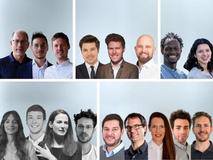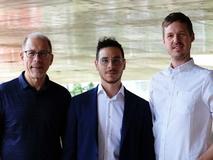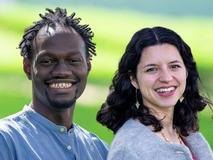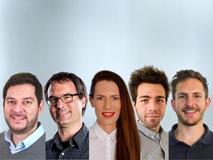Startups developing a technology to speed up drug discovery, a service to manage complex health data, a digital therapy for menstrual disorders, solutions to enable remote work abroad, and adaptive solar façades each win CHF 10,000
29.06.2022
IsoSpec Analytics, OptimaRatio, NALU, Vamoz, and Zurich Soft Robotics win Venture Kick's first stage of entrepreneurial and financial support. Their projects allow pharmaceutical companies to speed up the drug discovery and development phases by offering a faster and more reliable approach for biomolecular analysis; liberate chronic and rare disease patients from managing their complex health data; help women resolve menstrual disorders with their app through lifestyle interventions; enable companies to let their employees work from anywhere on a temporary basis, and offer multifunctional Adaptive Solar Facade (ASF) as a second building skin.
 |
 IsoSpec Analytics co-founders, from left to right: scientific advisor Prof. Thomas Rizzo, CEO Dr. Ahmed Ben Faleh, and CTO Dr. Stephan Warnke
|
 OptimaRatio, form left to right: CEO Tobias Kull, COO Fabian Boesch, and CTO Arne Wehling
|
 NALU's founders: Próspero Filipe and Lisa Filipe
|
 Vamoz from left to right: Sophie Boyle - Business & Finance, Daniel Dietrich - Operations & Sales, Isabelle Wildhaber - Legal, Johannes Pecher - Tech
|
 Zurich Soft Robotics, from left to right: CEO Bratislav Svetozarevic, Deputy CEO Lukas Lichtensteiger, Architect Vesna Kosoric, Engineer Alexander Zuest, and Technical lead Gabriel Kreuzer
|
IsoSpec Analytics: accurate molecular biometrics for faster drug and biomarker discovery
Drug development is a long and costly process with only one in twenty drug candidates succeeding to reach the market. This low success rate is partly owed to insufficient drug characterization in the early stages. IsoSpec Analytics is a bioanalytical technology spin-off from the Ecole Polytéchnique Fédérale de Lausanne (EPFL) that aims at reducing failure rates for drugs in fields including oncology and neurodegenerative diseases by providing key information during target validation and compound screening. Beyond pharmaceuticals, IsoSpec is developing its technology to become a tool of choice for early disease diagnostics by opening the door for the discovery of new biomarkers, attacking the disease at its root not at its symptoms. Additional market opportunities exist in food tech and agricultural science. The team is initially composed of CTO Dr. Stephan Warnke, scientific advisor Prof. Thomas Rizzo, and CEO Dr. Ahmed Ben Faleh as co-founders. They have co-developed the technology and its applications over the last 5 years. IsoSpec's patented technology will allow pharmaceutical companies to speed up the drug discovery and development phases by offering a faster and more reliable approach for biomolecular analysis. Their rapid separation and molecular infrared fingerprinting technology can eliminate bottlenecks, providing key information for optimal decision-making and development. They will initially provide advanced analytical services as a contract research organization, and at the same time develop their technology into a powerful, user-friendly instrument for pharmaceutical and medical laboratories.
IsoSpec Analytics estimates its total addressable market to be USD 1.8bn for pharma applications alone, while the demand for analytics in this field is expected to rapidly increase with a CAGR of 16.9%. The team is currently working on pilot projects with ten different companies ranging from small biotech startups to large multinationals in pharma and food tech.
The Venture Kick funds will allow the founding team to focus on business development and technological upgrades.
OptimaRatio: liberating chronic and rare disease patients from managing their complex health data
There are 33 million chronic and 4 million rare disease patients in the DACH region, whose health documents are scattered across the system. Current electronic patient records are just data sinks without further analysis or integration. This prevents doctors from finding relevant information quickly and looking at patients holistically. “It's always ME who has to think about it” is a common patient complaint, as captured by the SPO study in 2021. Patients already struggling with chronic diseases are overwhelmed by managing their own data and feel isolated.
OptimaRatio liberates chronic and rare disease patients from managing their complex health data. On behalf of the patient, OptimaRatio automatically searches all healthcare providers to find the relevant documents for automatic smartification: That is, documents are analyzed, their information linked, and made easily accessible for patients and their treating physicians. OptimaRatio thus goes far beyond governmental electronic patient dossiers. The team composed of Founders Arne Wehling and Tobias Kull, PhDs from the ETH Zurich, see themselves as a link between the numerous hospital information and medical practice management systems. Their mission is to give complex patients peace of mind when it comes to their health care by scheduling appointments when needed, enabling patient peer support, and offering holistic health analyses and care recommendations. In Switzerland alone, there are 2.7/0.4M chronic/rare disease patients, while the entire DACH region recently reached 33/4M, respectively. To reach patients via B2B, OptimaRatio aims at the 57’000 general practitioners and numerous specialized clinics in the DACH region with their Collect service as a SaaS for their patients.
They plan to use the Venture Kick funds for their website development, including a demo version of their Collect service, for external help to finalize the development of their prototype, and for cloud computing via amazon web services to process the health documents of their first 100 customers.
NALU: digital therapy for menstrual disorders
About 8 out of 10 women of reproductive age are affected by menstrual disorders during their lifetime. NALU addresses women with menstrual disorders, such as painful, absent, or irregular menstrual cycles, PMS, PCOS, or endometriosis.
NALU's team is composed of Lisa Filipe, who got her Master's degree at the University of Neuchâtel, and Próspero Filipe. Together they help women resolve menstrual disorders with their app through lifestyle interventions. Their digital therapy helps women to create healthy menstrual cycles without artificial hormones or drugs, with lifestyle interventions provided through an online course and community video calls. Their clients benefit from their solution by regaining their menstrual cycles after longer absences, improving their overall well-being especially due to the absence of menstrual pains and disorders, being able to get pregnant, and increasing the understanding of their bodies. NALU developed and launched its app and brand in December 2021 and has run a browser-based prototype before that. As of now, they had over 100 paying participants and a total of over 10'000 community followers. Their list price is 12 payments of CHF 45.-/Month or CHF 500.- for 1-year access to the full program. The team is currently designing their clinical trial and certifying it as a risk class I medical product.
The Venture Kick funds would contribute to the set up of audit-proof technical documentation as well as quality management and data security processes and certifications needed for insurance partnerships. mynalu.com
Vamoz: intelligent solutions to enable remote work abroad
A new style of working was created during the pandemic and employees got used to working remotely - also from different countries. Companies now want to offer temporary remote work abroad to employees as an official benefit, in order to attract and retain top talent - but they struggle to get a handle on the legal and business risks, as well as the extra workload. They fear the consequence of high financial costs and reputational damage from overstepping intransparent and unclear legal regulations (e.g. taxation, social security, data protection), as well as the risk of losing control and team cohesion.
Vamoz's team is composed of co-founders from the University of St. Gallen (HSG) Prof. Isabelle Wildhaber and Dr. Daniel Dietrich, along with Sophie Boyle and Johannes Pecher. They enable companies to let their employees work from anywhere on a temporary basis - whether that means working from the beach in Mexico or visiting relatives in Italy. This is done by assessing all relevant legal & business risks and guiding the operational process from beginning to end. The core solution is a web-based application, where employees file their remote work requests, HR makes informed approval decisions, and line managers keep an overview of who is working from where. Companies increase productivity and the happiness of their employees, whilst keeping control of their workforce & mitigating the risks.In total, a significant number of remote work requests have already been processed for multiple pilot partners since Q1 2022 and the beta version of the tool is scheduled for release soon.
The Venture Kick funds will be used to bridge business operations and product costs over the next 2-3 months ahead of seeking a pre-seed investment round. vamoz.io
Zurich Soft Robotics: Adaptive Solar Façade
Mid-sized to large industrial companies have a growing need for Building Integrated Photovoltaics (BIPV), however, rooftop space is limited. PV integrated into façades could be a solution, but existing systems are static and have low efficiency. Additionally, those would require additional cooling and shading systems, further increasing cost and energy consumption.
Zurich Soft Robotics offers its multifunctional Adaptive Solar Facade (ASF), a second building skin that solves both problems: The ASF increases the PV generation by up to 40% due to active solar tracking and the AI-controlled shading capabilities reduce the building cooling energy demand by 20-80% compared to traditional systems while improving occupants' comfort and well-being. The need for combining dynamic PV and shading systems has been articulated by several large clients, who have expressed keen interest in their sophisticated lightweight, and customizable PV solutions, both for new buildings and for the renovation of existing ones. BIPV is a fast-growing market with a CAGR of 27% in the EU. The team is composed of CEO Dr. Bratislav Svetozarevic PhD at ETH Zürich, Technical lead Gabriel Kreuzer, Architect Dr. Vesna Kosoric, Systems Engineer Alexander Züst and Deputy CEO Dr. Lukas Lichtensteiger. The team is currently working on a 1’300 m2 pilot project with Keller AG and is looking for further clients with similar needs.
They plan to use the Venture Kick funds to finance activities for their first pilot project and other interested clients, draft a pilot and demonstration project application for SFOE, and brand the ASF with a trademark and a website. zurichsoftrobotics.com
Drug development is a long and costly process with only one in twenty drug candidates succeeding to reach the market. This low success rate is partly owed to insufficient drug characterization in the early stages. IsoSpec Analytics is a bioanalytical technology spin-off from the Ecole Polytéchnique Fédérale de Lausanne (EPFL) that aims at reducing failure rates for drugs in fields including oncology and neurodegenerative diseases by providing key information during target validation and compound screening. Beyond pharmaceuticals, IsoSpec is developing its technology to become a tool of choice for early disease diagnostics by opening the door for the discovery of new biomarkers, attacking the disease at its root not at its symptoms. Additional market opportunities exist in food tech and agricultural science. The team is initially composed of CTO Dr. Stephan Warnke, scientific advisor Prof. Thomas Rizzo, and CEO Dr. Ahmed Ben Faleh as co-founders. They have co-developed the technology and its applications over the last 5 years. IsoSpec's patented technology will allow pharmaceutical companies to speed up the drug discovery and development phases by offering a faster and more reliable approach for biomolecular analysis. Their rapid separation and molecular infrared fingerprinting technology can eliminate bottlenecks, providing key information for optimal decision-making and development. They will initially provide advanced analytical services as a contract research organization, and at the same time develop their technology into a powerful, user-friendly instrument for pharmaceutical and medical laboratories.
IsoSpec Analytics estimates its total addressable market to be USD 1.8bn for pharma applications alone, while the demand for analytics in this field is expected to rapidly increase with a CAGR of 16.9%. The team is currently working on pilot projects with ten different companies ranging from small biotech startups to large multinationals in pharma and food tech.
The Venture Kick funds will allow the founding team to focus on business development and technological upgrades.
OptimaRatio: liberating chronic and rare disease patients from managing their complex health data
There are 33 million chronic and 4 million rare disease patients in the DACH region, whose health documents are scattered across the system. Current electronic patient records are just data sinks without further analysis or integration. This prevents doctors from finding relevant information quickly and looking at patients holistically. “It's always ME who has to think about it” is a common patient complaint, as captured by the SPO study in 2021. Patients already struggling with chronic diseases are overwhelmed by managing their own data and feel isolated.
OptimaRatio liberates chronic and rare disease patients from managing their complex health data. On behalf of the patient, OptimaRatio automatically searches all healthcare providers to find the relevant documents for automatic smartification: That is, documents are analyzed, their information linked, and made easily accessible for patients and their treating physicians. OptimaRatio thus goes far beyond governmental electronic patient dossiers. The team composed of Founders Arne Wehling and Tobias Kull, PhDs from the ETH Zurich, see themselves as a link between the numerous hospital information and medical practice management systems. Their mission is to give complex patients peace of mind when it comes to their health care by scheduling appointments when needed, enabling patient peer support, and offering holistic health analyses and care recommendations. In Switzerland alone, there are 2.7/0.4M chronic/rare disease patients, while the entire DACH region recently reached 33/4M, respectively. To reach patients via B2B, OptimaRatio aims at the 57’000 general practitioners and numerous specialized clinics in the DACH region with their Collect service as a SaaS for their patients.
They plan to use the Venture Kick funds for their website development, including a demo version of their Collect service, for external help to finalize the development of their prototype, and for cloud computing via amazon web services to process the health documents of their first 100 customers.
NALU: digital therapy for menstrual disorders
About 8 out of 10 women of reproductive age are affected by menstrual disorders during their lifetime. NALU addresses women with menstrual disorders, such as painful, absent, or irregular menstrual cycles, PMS, PCOS, or endometriosis.
NALU's team is composed of Lisa Filipe, who got her Master's degree at the University of Neuchâtel, and Próspero Filipe. Together they help women resolve menstrual disorders with their app through lifestyle interventions. Their digital therapy helps women to create healthy menstrual cycles without artificial hormones or drugs, with lifestyle interventions provided through an online course and community video calls. Their clients benefit from their solution by regaining their menstrual cycles after longer absences, improving their overall well-being especially due to the absence of menstrual pains and disorders, being able to get pregnant, and increasing the understanding of their bodies. NALU developed and launched its app and brand in December 2021 and has run a browser-based prototype before that. As of now, they had over 100 paying participants and a total of over 10'000 community followers. Their list price is 12 payments of CHF 45.-/Month or CHF 500.- for 1-year access to the full program. The team is currently designing their clinical trial and certifying it as a risk class I medical product.
The Venture Kick funds would contribute to the set up of audit-proof technical documentation as well as quality management and data security processes and certifications needed for insurance partnerships. mynalu.com
Vamoz: intelligent solutions to enable remote work abroad
A new style of working was created during the pandemic and employees got used to working remotely - also from different countries. Companies now want to offer temporary remote work abroad to employees as an official benefit, in order to attract and retain top talent - but they struggle to get a handle on the legal and business risks, as well as the extra workload. They fear the consequence of high financial costs and reputational damage from overstepping intransparent and unclear legal regulations (e.g. taxation, social security, data protection), as well as the risk of losing control and team cohesion.
Vamoz's team is composed of co-founders from the University of St. Gallen (HSG) Prof. Isabelle Wildhaber and Dr. Daniel Dietrich, along with Sophie Boyle and Johannes Pecher. They enable companies to let their employees work from anywhere on a temporary basis - whether that means working from the beach in Mexico or visiting relatives in Italy. This is done by assessing all relevant legal & business risks and guiding the operational process from beginning to end. The core solution is a web-based application, where employees file their remote work requests, HR makes informed approval decisions, and line managers keep an overview of who is working from where. Companies increase productivity and the happiness of their employees, whilst keeping control of their workforce & mitigating the risks.In total, a significant number of remote work requests have already been processed for multiple pilot partners since Q1 2022 and the beta version of the tool is scheduled for release soon.
The Venture Kick funds will be used to bridge business operations and product costs over the next 2-3 months ahead of seeking a pre-seed investment round. vamoz.io
Zurich Soft Robotics: Adaptive Solar Façade
Mid-sized to large industrial companies have a growing need for Building Integrated Photovoltaics (BIPV), however, rooftop space is limited. PV integrated into façades could be a solution, but existing systems are static and have low efficiency. Additionally, those would require additional cooling and shading systems, further increasing cost and energy consumption.
Zurich Soft Robotics offers its multifunctional Adaptive Solar Facade (ASF), a second building skin that solves both problems: The ASF increases the PV generation by up to 40% due to active solar tracking and the AI-controlled shading capabilities reduce the building cooling energy demand by 20-80% compared to traditional systems while improving occupants' comfort and well-being. The need for combining dynamic PV and shading systems has been articulated by several large clients, who have expressed keen interest in their sophisticated lightweight, and customizable PV solutions, both for new buildings and for the renovation of existing ones. BIPV is a fast-growing market with a CAGR of 27% in the EU. The team is composed of CEO Dr. Bratislav Svetozarevic PhD at ETH Zürich, Technical lead Gabriel Kreuzer, Architect Dr. Vesna Kosoric, Systems Engineer Alexander Züst and Deputy CEO Dr. Lukas Lichtensteiger. The team is currently working on a 1’300 m2 pilot project with Keller AG and is looking for further clients with similar needs.
They plan to use the Venture Kick funds to finance activities for their first pilot project and other interested clients, draft a pilot and demonstration project application for SFOE, and brand the ASF with a trademark and a website. zurichsoftrobotics.com


